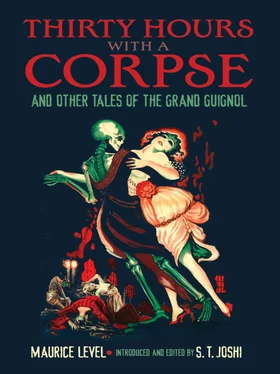At daylight Barthe got up, raised the shades, turned out the light, took his place again on the divan, face to the wall, and seemed to be soundly asleep.
“Now that he’s quiet, I can sleep,” thought Guiret, and lifted his feet on a stool, his head in the comfortable curved back of the armchair. In the beginning of that torpor where the will held but fragile control, he recalled vividly the events of the night before, events that he dare not think of in his waking moments for fear that once started on the path of memory he would find himself unable to stop when he reached the first premises of that terrible climax, the result of which was now securely locked and strapped in Barthe’s large trunk.
It had been a gay evening at the start. Guiret and Barthe had gone by special invitation to the apartment of Roland Marousse, a wealthy merchant, who found, in common with the two students, pleasure in card-playing and gambling. It was the first of the month and both Guiret and his roommate had received their allowances. It was planned that the three of them would go together to another apartment where they would meet other acquaintances. They had expected to find Marousse alone….
Guiret, half-conscious, knew that he was breathing heavily, as he had heard Barthe breathe when he first tried to sleep, and he knew that if he could not throw off the torpor of weariness, pull himself out of the swoon that he was in, he would like Barthe go on and on until he, too, awakened with a hoarse, strangled cry.
“No—no—no—” he muttered, and that was what he was saying when suddenly he sat bolt upright in his chair, rubbing his eyes with his palms.
How much time had elapsed, he could not tell. Possibly he had slept for a while before the recollections started to turn into the nightmare. He listened, hoping to hear a clock strike. From the sounds below in the street it must be ten o’clock or later.
“Armand—Armand—” he said tensely. “Wake up—someone is coming up the stairs!”
Barthe awakened with a start of fright and Guiret tried to calm him:
“What is there to worry about? It must be Legros. If he’s coming here who else could it be?” he asked confusedly.
He went to the door and unlocked it, opened it wide. Then he fell back into the room.
“Who is it?” Barthe asked, from the bedroom where he had gone as if to hide himself.
“Marousse!” Guiret exclaimed. “What on earth has brought you here so early?”
Marousse came into the room wearily. He seemed very tired and somewhat embarrassed.
“I was passing. I hope I do not disturb you.”
“No, no!”
Marousse looked at the trunk: “You are leaving—”
“For a short stay at Cannes. We are waiting for the concierge to bring the bill. Sit down—sit down—”
Marousse sat down uneasily and looked around the room. “Where is Barthe?”
“In his bedroom. He—he has a headache. Ill luck, too, when we have planned to take the train this afternoon. Armand—”
“Don’t bother him. I know how one feels with a headache. I’m none too well myself,” Marousse said wearily.
Guiret noticed that his usual jovial expression was lacking. He showed his age this morning. His body looked as if it had suddenly become emaciated.
A constrained silence seemed to weigh upon them. Guiret was the first to break it.
“Oh, Marousse,” he said, fumbling in his pocket. “Don’t let me forget that little sum of money I owe you.”
“Never mind. Let it go,” Marousse protested. “You’ll be back, won’t you?”
“Of course—but I want you to know that I wouldn’t leave— even for a trip without mentioning—”
“Never mind. I cannot think or care about money. I am too much disturbed.” He broke off, waiting for Guiret to question him. Guiret did not offer to do so and he went on: “I am terribly worried. Chouchou has not come back.”
“I have not seen her, not since she left us night before last.”
“But—I don’t understand—”
“Neither do I. You recall what happened. I should think you might well remember. Both you and Barthe lost so much at cards. You noticed, no doubt, that—” he hesitated, embarrassed, then forced himself to continue—”that Chouchou and I quarreled.”
“Yes, I mean I—I thought no more about it.”
“I was jealous, I admit. I should not have been, but I was. She was trying always to—to be alone with—well—” he lowered his voice—”with Barthe—you noticed, did you not?”
“Yes, I did—”
“She had won so much at cards from all of us I thought she should go on playing and I told her so—well, you know how she got angry at me in the taxi on the way home and got out and called a taxi to go to her apartment—I haven’t seen her since—”
“But that was night before last—”
“Yes! That’s why I am so worried. When I got to my apartment I telephoned her, you know, to find out if she was still angry. No answer. I called later, in an hour. Still no answer. You remember it was very late when we parted. I slept a little, then took a bath and changed my clothes, and telephoned again. Still no Chouchou—”
“Perhaps she was there but did not answer the phone.”
“That’s what I thought. I called a taxi and went to her place. The maid had not seen her. She had not been back that night. I knew she could not be shopping. She had not been back to change her clothes, and she would not go about in evening clothes in the morning. I waited a while. Ten o’clock, half past ten, then I decided to telephone her friends. No one had seen her. I went down in the street and waited for an hour before the door, watching the taxis go by, expecting, hoping every moment to see her step out.”
“And she did not?”
“Would I be here worrying about her if she had? You can understand that I was terribly uneasy—” Marousse seemed to be playing with words, repeating himself in an attempt to reach what he had come to say: “When night came again and the street lamps were on I lost my head completely, or I did the right thing, I don’t know. I went to the police.”
“You did!” Guiret exclaimed.
“What else could I do? What would anyone have done in my place? A well-dressed woman, with valuable jewels—Chouchou always carries a large sum of money on her. I have known her to go out with four thousand francs to buy a postage stamp. I am sure something terrible has happened to her—or—” He broke off and perspiration beaded his pasty forehead.
Guiret tried to think of something to say to calm him, for his own forehead was damp at the thought of Marousse going again to the police.
“What I am about to say may seem brutal, Marousse, but is it not possible that Chouchou— Are you quite sure that—I mean, if she were deceiving you with someone else that would explain—”
Marousse tapped his shoe with the end of his cane. He showed no resentment or surprise at what Guiret had said. On the contrary, after one or two attempts to speak, he seemed to agree by nodding his head.
“Yes, I have asked myself that,” he said, after a while. “And since you are frank with me, I will be frank with you. I had the firm conviction that you know where she is.”
“Me!” Guiret exclaimed.
“You need not pretend with me. I am no longer a boy, I am past forty-five, neither handsome nor clever. I have nothing except money to offer a pretty young woman like Chouchou. I understand that and would excuse many things.”
“I don’t see what you’re trying to get at,” Guiret said.
“I am neither a fool nor blind. I tell you that I could not help noticing that Chouchou and Barthe—before he lost so heavily at cards that he was depressed—did you not notice? What I mean to say is, I would be the happiest man on earth to learn that she is alive and well. That’s how much I have suffered with worry. Even though she had come here to wait for Barthe after she left us—”
Читать дальше












